Whether you’re a fintech executive, IT professional, or startup entrepreneur navigating the complex world of cloud services, we’ve got you covered. In this article, we’ll take the frustration out of choosing a cloud computing service that’s right for you, and provide actionable insights to help you make informed decisions. Here’s what you’ll learn:
- The Basics of Cloud Computing Services
- The Importance of Cloud Services in Fintech
- How to Choose the Right Cloud Provider (Detailed Guide)
- Different Types of Clouds
- Top Cloud Service Providers for Fintech (With Comparison Table)
- Tips on How to Migrate to a New Cloud Service
P.S., Looking for cloud computing services for seamless migration and integration? Miquido is Europe’s leading Fintech app development company specializing in cost-effective cloud development, deployment, and migration. Get in touch with us today for a free consultation.
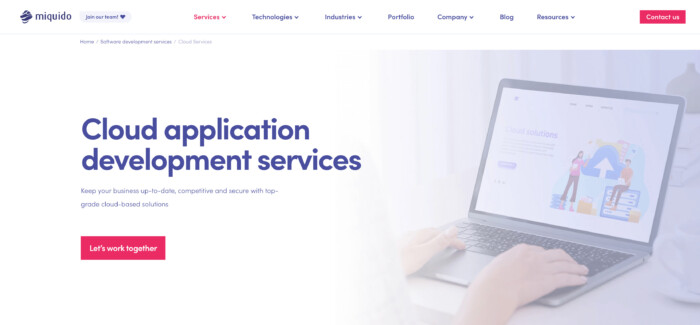
What is a Cloud Computing Service?
In today’s digital age, cloud computing has revolutionized the way businesses operate, offering a flexible and scalable solution to their IT infrastructure needs.
Cloud computing refers to the delivery of computing services over the internet, allowing businesses to access servers, storage, databases, networking, and software on-demand from cloud service providers.
This eliminates the need for owning and maintaining physical hardware, streamlining operations and reducing costs.
Cloud computing services are typically categorized into three main models:
- Infrastructure as a Service (IaaS): Offers fintech companies virtualized computing resources via the internet, including virtual machines and storage. This enables scalability without the burden of managing physical hardware, allowing businesses to adjust their infrastructure as demand fluctuates.
- Platform as a Service (PaaS): Provides a development environment hosted in the cloud, enabling fintech companies to build, deploy, and manage applications without worrying about underlying infrastructure. This fosters rapid development and innovation, accelerating time-to-market for new products and services.
- Software as a Service (SaaS): Delivers software applications over the internet on a subscription basis, eliminating the need for installation and maintenance. Fintech companies can leverage SaaS solutions for various functions, such as customer relationship management (CRM) or accounting software, to streamline operations and enhance efficiency.
Miquido also uses the latest security, networking, storage, analytics, and testing tools for easy implementation and upscaling, and protection against down time and security breaches. Want to discuss your project? Give them a shout today!
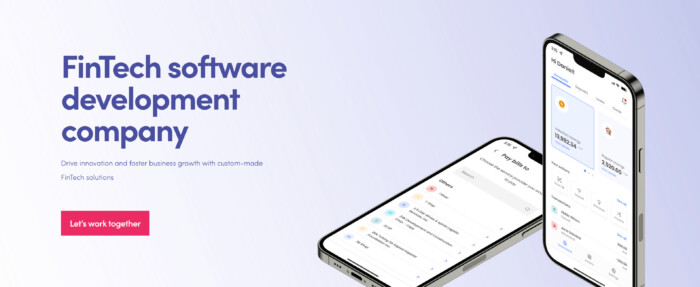
Benefits of Having a Cloud Computing Service as a Fintech Company
Fintech companies operate in a dynamic and fast-paced environment where agility, scalability, and security are paramount. Embracing cloud computing offers numerous advantages for fintech companies:
- Scalability: Cloud services provide the flexibility to scale resources up or down based on demand, allowing fintech companies to efficiently manage fluctuations in workload and user activity without the need for costly infrastructure investments.
- One application of this is during peak periods such as tax season or holiday shopping spikes: fintech platforms can seamlessly accommodate increased traffic without disruptions.
- Cost Efficiency: By eliminating the need for on-premises hardware and infrastructure maintenance, cloud computing can significantly reduce operational costs for fintech companies. With pay-as-you-go pricing models, businesses only pay for the resources they use, optimizing cost efficiency.
- Innovation and Agility: Cloud computing enables rapid innovation and experimentation, empowering fintech companies to quickly develop and deploy new products and services to market. With cloud-native technologies, businesses can leverage cutting-edge tools and technologies to stay ahead of the competition.
For example, using cloud-based machine learning and artificial intelligence (AI) algorithms, fintech companies can analyze vast amounts of data in real-time to personalize user experiences and detect fraudulent activities. - Enhanced Security and Compliance: Leading cloud providers offer robust security measures and compliance certifications, such as multi factor authentication and access controls, ensuring the protection of sensitive financial data and regulatory compliance for fintech companies.
From encryption to identity and access management, cloud services provide comprehensive security features to safeguard critical assets. Additionally, cloud providers invest heavily in compliance programs to meet industry-specific regulations, such as PCI-DSS for payment processing or GDPR for data privacy.
By leveraging these security features, fintech companies can mitigate risks and build trust with their customers.
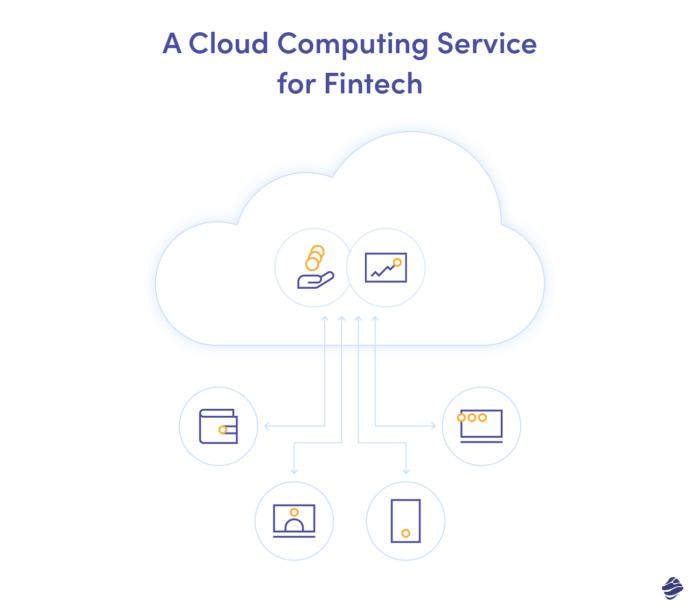
Factors to Consider When Selecting a Cloud Service Provider
In the competitive fintech landscape, choosing the right cloud service provider is a strategic decision that can significantly impact your business’s success. Let’s explore the key factors you should consider to make an informed choice:
Types of Clouds
Before diving into specific providers, it’s essential to understand the different types of cloud computing:
Understanding Public, Private, and Hybrid Clouds
Public Cloud:
- Offers resources and services to the general public over the internet, providing scalability and cost-effectiveness.
- Ideal for startups and small fintech companies looking for agility and flexibility. For example, a startup launching a new financial app can quickly scale its infrastructure to accommodate growing user demand without investing in physical servers.
Private Cloud:
- Dedicated resources and infrastructure solely for one organization, providing enhanced security and control.
- Suitable for larger fintech enterprises with strict compliance requirements and sensitive data. For instance, a large financial institution handling sensitive information may opt for a private cloud to maintain regulatory compliance and data sovereignty.
According to a Forbes Digital Banking Survey done in 2022, 78% of Americans prefer online banking and that number is expected to increase every year. Furthermore, 45% of online bankers use mobile apps to access their accounts, and now more than ever, security is of the utmost importance for customers.
Read next: The Mobile Banking App Market: An Introduction for Fintech by Miquido
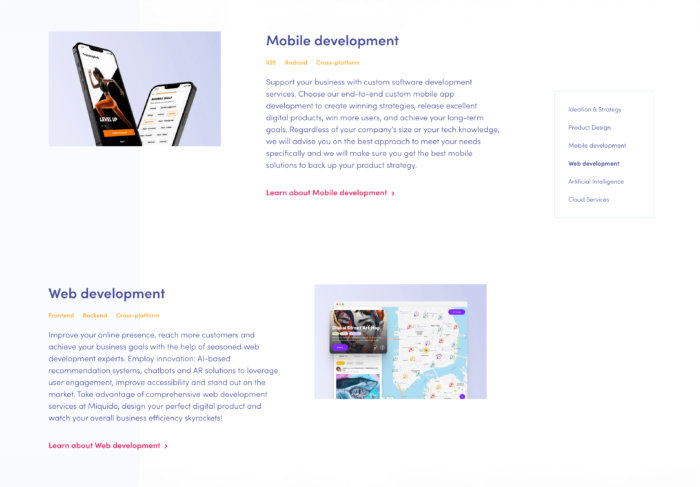
Hybrid Cloud:
- Combines elements of both public and private clouds, allowing fintech companies to leverage the benefits of both worlds.
- Offers flexibility, scalability, and customization, making it an attractive option for businesses with varying workloads and regulatory constraints.
For example, a fintech company may use a hybrid cloud to run its core banking applications on a private cloud while leveraging the scalability of a public cloud for customer-facing services.
Customization and Scalability
In fintech, scalability and customization are critical factors to consider when selecting a cloud service provider. Fintech companies need to ensure that the chosen provider can accommodate their growing needs and offer tailored solutions to meet specific requirements.
Additionally, availability and reliability are essential considerations to prevent downtime and ensure uninterrupted operations.
- Scalability: What if you need to scale from handling thousands to millions of transactions daily? Choose a cloud provider that offers seamless scalability to automatically adjust resources based on demand.
- Customization: Need specific tools for blockchain or another niche? Find a cloud service that allows for tailored solutions to fit your unique technological needs.
- Availability: If your fintech service must be accessible 24/7, you’ll want to opt for a provider with multi-regional deployment capabilities to ensure uninterrupted operations, even in the event of a data center outage.
- Reliability: Facing variable loads, especially during peak seasons? Ensure your provider guarantees high uptime, with the ability to handle sudden spikes in demand, keeping your services running smoothly.
Compliance and Security Concerns
When entrusting sensitive financial data to cloud services providers, compliance and security become paramount concerns for fintech businesses. It’s crucial to evaluate how different providers meet regulatory requirements and offer robust security measures to protect against data breaches and cyber threats.
Regulatory Compliance
- Look for cloud providers with important certifications like SOC 2, PCI-DSS, and GDPR. These show they’re serious about protecting data and follow strict privacy rules.
- Make sure the provider meets local financial regulations, which can vary by country.
Security Measures
- Encryption: Essential for keeping data safe, both when stored and sent over the internet.
- Network Security: Providers should have strong defenses like firewalls and intrusion detection to stop cyber threats.
- Access Controls: Only authorized people should access sensitive information, managed through identity and access management systems.
- Physical Security: The physical locations where data is stored must be well-protected against unauthorized access or hazards.
Continuous Security Checks
- Security Audits: Regularly check your cloud setup to find and fix security gaps.
- Penetration Testing: Occasionally test your defenses by simulating cyber attacks.
Pro Tip: Regularly reviewing your security with audits and tests helps catch issues early. Choosing a provider that’s strong on compliance and security is key to keeping your data safe.
At Miquido, we help fintech companies build cost-effective cloud solutions designed to maximize value for organizations of all sizes. Not only that, but we also help build the applications themselves, like Flutter fintech apps, which save you the extra cost of having to pay for an app for each of your platforms. This technology uses one codebase to allow your UI to operate on multiple platforms.
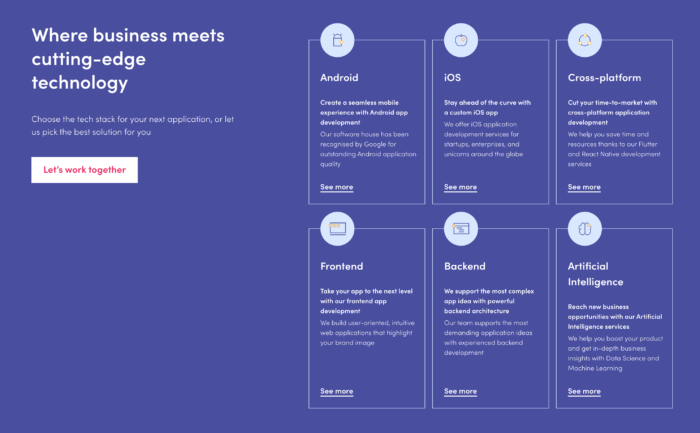
Cost Considerations – Staying Within Your Budget
While cost should not be the sole determining factor, it’s essential to evaluate the financial implications of choosing a specific cloud provider.
Consider factors such as
- Pricing models
- Pay-as-you-go: This model allows you to pay only for the resources you consume, making it flexible and scalable. It’s ideal for businesses with fluctuating demands, as it avoids the need for significant upfront investments in capacity that might not be used consistently.
- Reserved Instances or Savings Plans: For predictable workloads, committing to a certain level of resource usage over a fixed term (e.g., one or three years) can lead to substantial discounts compared to on-demand pricing. This requires a good understanding of your long-term needs but can offer significant savings.
- Upfront costs
- Initial Setup: Some cloud providers charge initial setup fees for configuring your cloud environment. However, many providers offer a free tier or credits for startups to reduce this barrier.
- Migration Costs: If you’re moving from on-premises infrastructure or another cloud provider, consider the costs associated with data migration, including any necessary tools or services to facilitate the move.
- Ongoing expenses
- Operational Costs: Beyond compute, storage, and network resources, consider the costs of additional services such as databases, analytics, machine learning, and blockchain services. These can significantly impact your monthly bill.
- Management and Support: Depending on your team’s expertise, you might need to opt for a support plan or managed services, which add to the monthly costs but provide valuable assistance and peace of mind.
- Potential savings
- Automation: Look for cloud services that offer automation tools for resource scaling, backup, and security. Automating these tasks can reduce the need for manual intervention, saving labor costs and reducing the risk of human error.
- Cost Management Tools: Utilize built-in cost management and optimization tools provided by cloud services to monitor, manage, and optimize your resource usage in real time. This can help you identify and eliminate waste, such as underutilized instances or orphaned resources.
- Custom Discounts: Engage in negotiations with cloud providers for custom discounts based on your anticipated usage volume, especially if you’re a large enterprise or have the potential for rapid growth.
Choose CSPs that offer transparent pricing and flexible payment options, such as pay-as-you-go or subscription-based models, to optimize cost efficiency and align with your budgetary constraints. Keep your capital expenditure in mind and start researching other providers if your first choice does not afford you the cost savings you’re looking for.
Miquido Tip: Take advantage of cost management tools and services offered by cloud providers to monitor and optimize your cloud spending, ensuring maximum value for your investment.
Reputation: Assessing Company Track Record and Customer Reviews
When selecting a cloud service provider, it’s essential to assess the reputation and track record of the company. Seek out providers with a proven track record of reliability, stability, and customer satisfaction to ensure a positive experience and long-term partnership.
Here are some questions you should be thinking about when choosing a cloud service provider:
- Company Track Record and Performance
- How does your uptime compare to other providers in the last year?
- Can you provide case studies or examples of fintech companies you’ve successfully supported?
- What measures do you take to ensure low latency and high performance for financial applications?
- How do you handle scalability and reliability during peak transaction periods?
- Customer Reviews and Testimonials
- Can you provide references from current or past customers, especially within the fintech sector?
- How would you describe your customer service and technical support based on feedback from your clients?
- Are there any third-party review sites or industry reports where we can find unbiased reviews of your services?
- Security and Compliance
- How do you ensure the security and privacy of our data, and what certifications do you hold (e.g., PCI DSS, SOC 2)?
- Can you detail your experience with regulatory compliance specific to the financial industry?
- Innovation and Future-Proofing
- How do you stay ahead in terms of technology and innovation, especially regarding fintech needs?
- What is your roadmap for new features or services that could benefit fintech companies?
- Support and Partnership
- What kind of support can we expect, and are there different levels or tiers of service?
- How do you approach partnerships with fintech companies to ensure mutual growth and success?
- Cost and Investment
- How transparent are your pricing models, and can you provide examples of how costs might scale with our growth?
- Are there any cost-saving measures or optimizations that you recommend to your fintech clients?
Asking these questions will give you a comprehensive view of a cloud service provider’s reputation, reliability, customer satisfaction, and suitability for your fintech company’s needs.
Tip: Ask for recommendations from industry peers and participate in online forums and communities to gather insights and feedback on potential cloud providers before making a decision.
Making Sense of the Data: Using Analytics and Reporting Tools
Harnessing the power of data analytics and reporting tools can provide valuable insights for fintech companies. Evaluate the analytics capabilities offered by cloud service providers, such as data visualization, predictive analytics, and real-time reporting, to gain actionable insights and drive informed decision-making.
Look for providers that offer robust analytics tools and support for data-driven strategies to unlock the full potential of your data assets.
Tip: Leverage machine learning and AI-driven analytics tools to uncover hidden patterns and trends in your data, enabling predictive and prescriptive analytics for strategic decision-making.
Top Cloud Service Providers for Fintech Companies
Choosing the right cloud service provider is crucial for fintech companies, as it can significantly impact their operations, scalability, and security. Here are some top cloud service providers renowned for their offerings in the fintech industry:
1. Amazon Web Services (AWS)
- Cost: Offers a pay-as-you-go pricing model with various pricing options based on usage.
- Pros: Extensive range of services, global infrastructure, high reliability, strong security features, and scalability.
- Cons: Complex pricing structure, may incur additional costs for certain services.
- Clients: Fintech companies such as Robinhood, Stripe, and Coinbase rely on AWS for their infrastructure needs.
- Offerings: AWS provides a wide range of services, including compute, storage, databases, analytics, machine learning, and more.
Fintech companies using AWS
- Robinhood: The trading platform uses AWS for its scalability and reliability, enabling it to handle millions of transactions without downtime
- Stripe: Utilizes AWS for its infrastructure, benefiting from AWS’s global reach and extensive suite of services to process payments securely and efficiently
- Coinbase: Leverages AWS to securely store a vast amount of digital currencies and to scale its operations as the cryptocurrency market grows
2. Microsoft Azure
- Cost: Offers flexible pricing options, including pay-as-you-go and reserved instances.
- Pros: Integration with Microsoft products, global presence, strong compliance certifications.
- Cons: Learning curve for beginners, occasional service disruptions.
- Clients: Fintech firms like PayPal, Nasdaq, and Mastercard leverage Azure for their cloud infrastructure.
- Offerings: Microsoft Azure offers services such as virtual machines, databases, AI, IoT, and DevOps tools.
Fintech companies using Azure
- PayPal: Uses Azure for its agility and global infrastructure, which supports PayPal’s extensive network of users and transactions
- Nasdaq: Leverages Azure for its cloud capabilities, particularly for real-time data analytics and the secure processing of financial transactions
- Mastercard: Utilizes Azure’s cloud services for processing millions of secure payments transactions across its global network
3. Google Cloud Platform (GCP)
- Cost: Provides Google services like a pricing calculator for estimating costs, with pay-as-you-go options.
- Pros: High-performance infrastructure, strong data analytics capabilities, innovative AI and machine learning services.
- Cons: Smaller market share compared to AWS and Azure, fewer regional data centers.
- Clients: Fintech companies including Coinbase, Stripe, and Brex utilize GCP for their cloud needs.
- Offerings: Google Cloud Platform offers services such as compute, storage, databases, machine learning, and data analytics among other benefits.
Fintech companies using Google Cloud Platform
- Coinbase: Also utilizes GCP for the secure storage of digital currencies, benefiting from Google’s robust security and advanced data analytics capabilities
- Stripe: Uses GCP’s global infrastructure and machine learning technologies to enhance its services and fraud detection capabilities
- Brex: Leverages GCP for its core financial services, taking advantage of Google’s data analytics and machine learning services to offer insights and improve customer experiences
4. IBM Cloud
- Cost: Offers flexible pricing options, including pay-as-you-go and reserved instances.
- Pros: Strong security features, industry-specific solutions, hybrid cloud capabilities.
- Cons: Complex pricing structure, fewer services compared to competitors.
- Clients: Customers include Fintech firms like Bank of America, JPMorgan Chase, and Citi use IBM Cloud for their cloud infrastructure.
- Offerings: IBM Cloud offers services such as AI, blockchain, IoT, and data analytics, tailored for the fintech industry.
Fintech companies using IBM Cloud
- Bank of America: Uses IBM Cloud for its financial services workloads, benefiting from IBM’s regulatory compliance and security features
- JPMorgan Chase: Leverages IBM Cloud to enhance its financial services, utilizing IBM’s cloud capabilities for secure and efficient processing of banking operations
- Citi: Utilizes IBM Cloud for its robust security features and global infrastructure, supporting Citi’s vast array of financial services
5. Oracle Cloud Infrastructure (OCI)
- Cost: Provides predictable pricing with pay-as-you-go options and discounts for longer commitments.
- Pros: High-performance computing, strong security features, comprehensive suite of cloud services.
- Cons: Limited availability zones, fewer third-party integrations compared to competitors.
- Clients: Fintech companies such as Barclays, Credit Suisse, and HSBC leverage OCI for their cloud needs.
- Offerings: OCI offers services such as compute, storage, networking, databases, and AI.
Fintech companies using Oracle
- Barclays: Leverages OCI for its high-performance computing and strong security features, which are crucial for the bank’s global financial services
- Credit Suisse: Uses OCI for its financial services, benefiting from Oracle’s comprehensive suite of cloud services and security capabilities
- HSBC: Utilizes OCI for its global banking operations, taking advantage of Oracle’s global infrastructure and high-performance computing capabilities
Future Trends in Cloud Computing for Fintech
As technology continues to evolve, it’s essential for fintech companies to stay ahead of emerging trends in cloud computing.
Keep an eye on developments such as serverless computing, edge computing, and quantum computing, and, of course, the future of AI in Fintech, which has the potential to reshape the fintech landscape.
Serverless Computing
- Cost Efficiency: Reduces overhead by charging only for the computing resources you use, eliminating the need for pre-provisioned servers.
- Scalability: Automatically scales your application up or down based on demand, ideal for handling varying transaction volumes in fintech.
- Faster Time-to-Market: Enables quicker development and deployment of applications, speeding up innovation and response to market changes.
Edge Computing
- Reduced Latency: Processes data closer to where it’s generated, significantly cutting down response times for financial services that rely on real-time data.
- Enhanced Security: By processing data locally, sensitive information can be analyzed and acted upon without the need to transfer it over long distances, reducing exposure to cyber threats.
- Improved Reliability: Ensures continued operation and data processing even with intermittent cloud connectivity, crucial for mission-critical financial operations.
Quantum Computing
- Advanced Data Analysis: Offers the potential to process complex datasets far more efficiently than traditional computers, opening new avenues for risk analysis and fraud detection.
- Cryptography and Security: While posing challenges to current encryption methods, it also promises the development of new, quantum-resistant cryptographic algorithms, enhancing data security.
- Accelerated Computing Power: Can significantly speed up financial modeling and simulations, leading to better investment strategies and financial products.
Artificial Intelligence (AI)
- Enhanced Customer Experience: AI-driven chatbots and personalized financial advice can improve customer service and engagement.
- Fraud Detection and Prevention: AI algorithms can analyze transaction patterns to identify and prevent fraud in real-time, enhancing security.
- Operational Efficiency: Automates routine tasks, from customer verification to compliance checks, reducing costs and human error.
P.S., Interested in leveraging the power of AI to your advantage? Miquido can help your fintech business gain that competitive edge over the competition by integrating AI into your solutions. Start with a free consultation.
The Rise of Flutter Fintech Apps
Flutter fintech apps have become increasingly common and for good reason. The rise of Flutter fintech apps can be attributed to its ability to offer fast, efficient, and expressive development experiences for cross-platform applications.
- Cross-Platform Efficiency: Flutter enables the development of natively compiled applications for mobile, web, and desktop from a single codebase, simplifying the process of creating and maintaining apps across multiple platforms.
- Rapid Development and Customizable UI: Offers a rich set of customizable widgets and the “hot reload” feature, allowing for immediate UI updates and speeding up the development cycle, which is crucial for fintech companies aiming to quickly adapt to market changes.
- Consistent User Experience: Ensures a seamless and consistent user experience across all platforms, which is vital for retaining users and building trust in fintech applications.
By staying informed and adaptable, fintech companies can leverage the latest innovations in cloud technology to drive growth and innovation.
Tip: Invest in continuous learning and development initiatives to upskill your team and stay abreast of emerging technologies and trends in cloud computing, ensuring your business remains competitive and future-ready.
Migrating to A New Cloud Service? Don’t Forget These Tips
1. Plan Thoroughly
- Assess Your Needs: Understand the specific requirements of your fintech operations, including compliance, scalability, security, and performance needs.
- Map Out Your Migration: Develop a detailed migration plan that includes timelines, responsibilities, and the sequence of moving different components.
2. Choose the Right Cloud Provider
- Compatibility: Ensure the cloud service is compatible with your existing systems and technologies. For instance, if your fintech relies heavily on .NET, opt for a provider with first-class support for Windows-based applications.
- Support and Services: Look for providers that offer robust support and migration services to assist you through the process. A fintech moving from on-premises to the cloud selected a provider offering 24/7 support and a comprehensive set of migration tools.
3. Focusing on Security and Compliance
- Data Protection: Implement encryption and other security measures to protect data during and after migration. A mobile payment platform may encrypt all data in transit and at rest as part of its cloud migration strategy.
- Regulatory Compliance: Verify that the cloud service meets all relevant financial regulatory and compliance requirements. A global remittance service ensured their chosen cloud provider was compliant with GDPR in Europe and CCPA in California before migrating.
4. Test Extensively
- Pilot Programs: Run pilot migrations with non-critical systems to identify potential issues and refine your process. A fintech firm might test the cloud with its internal HR system before moving its customer-facing transaction processing.
- Integration Testing: Test the integration points between your existing systems and the cloud service thoroughly to ensure smooth operation.
5. Train Your Team
- Skill Development: Provide training and resources to your team on cloud technologies and the specific platforms you’re adopting. For example, you might want to offer AWS certification courses to their IT staff ahead of their cloud migration.
- Change Management: Prepare your organization for change by communicating the benefits and impacts of migrating to the cloud. Leadership could hold a series of workshops to explain how cloud migration would lead to faster deployment times and better scalability for their banking app.
6. Leverage Automation
- Automate Migration Tasks: Use tools and services that can automate parts of the migration process to reduce manual errors and save time. A payments processor used cloud migration tools to automatically replicate their database schemas in the cloud.
- Infrastructure as Code (IaC): Utilize IaC for configuring and managing your cloud environment, ensuring consistency and faster deployment. An insurance tech company managed its entire cloud setup through Terraform scripts, enabling quick environment provisioning and updates.
7. Monitor and Optimize
- Performance Monitoring: Set up monitoring tools to keep track of your system’s performance and quickly address any issues. After migrating, a brokerage firm used cloud-native monitoring services to detect and resolve latency issues in real time.
- Cost Management: Regularly review and optimize your cloud usage and costs to ensure you’re getting the most out of your investment. You may want to implement cost alerts and used reserved instances to reduce cloud expenses.
- Reserved Instances (RIs) offer businesses a way to reserve cloud capacity in advance for a fixed period, typically one to three years, at a significantly discounted rate compared to on-demand pricing. This approach guarantees capacity availability and helps in budgeting, but requires careful management due to the long-term commitment and need for usage optimization.
8. Ensure Business Continuity
- Backup and Disaster Recovery: Implement robust backup and disaster recovery plans to minimize downtime and data loss during the migration. Before migrating, a peer-to-peer lending platform established multi-region backups to ensure quick recovery in case of an outage.
Choosing a Cloud Services Provider Couldn’t be Easier.
Navigating the vast landscape of cloud services can seem daunting, but armed with the insights from this guide, you’re now equipped to make informed decisions for your fintech business.
Remember, understanding the different types of clouds, evaluating key factors like scalability and security, and considering reputable providers are essential steps in choosing the right cloud service for your needs.
Let’s quickly recap. We’ve taught you to:
- Understand the types of clouds: public, private, and hybrid.
- Prioritize scalability, security, and compliance.
- Consider factors such as cost, integration capabilities, and technical support.
- Research reputable cloud service providers and assess their offerings.
One More Thing…
Psst! If you’re seeking a customer-oriented approach to integrating cloud solutions and building scalable applications in the fintech sector, Miquido is Europe’s leading Fintech app development company with a track record of hugely successful projects like Nextbank, Brainly, and Klassik Radio.
From infrastructure setup and migration to ongoing support and optimization, Miquido leverages the latest technologies and industry best practices to help you achieve your business objectives with ease. So why wait? Reach out to Miquido today and take your fintech business to new heights in the cloud.
Schedule a free consultation today.
What factors should I consider when choosing a cloud services provider?
Considerations include scalability, security, compliance, cost-effectiveness, technical support, and service level agreements.
What are the key features to look for in a fintech cloud service provider?
Look for features such as data encryption, data backups, storage space, customizable solutions tailored to fintech industry needs, and real-time analytics capabilities.
What are some important factors to keep in mind when selecting a public cloud provider?
Consider the provider’s reputation, reliability, compliance with industry standards, native compatibility with your applications, and competitive services offered.
How can I ensure that a cloud services provider meets my business needs?
Start by researching the provider’s track record, customer reviews, and case studies. Additionally, inquire about their experience in serving businesses similar to yours and their ability to address your specific requirements.
What should I look for in a service level agreement (SLA) with a cloud services provider?
Look for guarantees on uptime, performance, security measures, data protection, disaster recovery, and penalties for breaches of the service level agreement.
What are the advantages of using Google Cloud Platform (GCP) for my cloud services?
GCP offers high-performance infrastructure, strong data encryption, competitive pricing, extensive storage options, and advanced analytics tools, making it a top fintech cloud service provider.
How can a cloud services provider assist with infrastructure management?
Providers can handle tasks such as provisioning, monitoring, scaling, and maintenance of infrastructure, freeing up your resources to focus on core business activities.
What are the benefits of having access to real-time analytics with a cloud services provider?
Real-time analytics enable businesses to gain insights from large volumes of data instantly, allowing for informed decision-making and timely responses to market changes.






